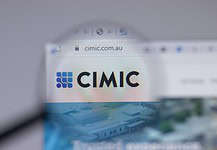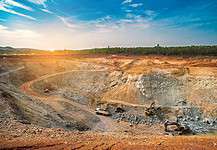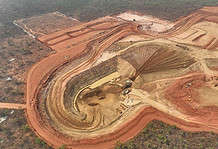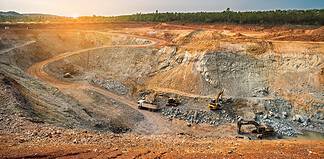2019 was indeed a year to remember for Northern Star Resources.
The company signed off the December quarter as a 1moz per year gold producer, with four Tier 1 assets in its portfolio: the Jundee and Kalgoorlie mines, a half–share in the Kalgoorlie Super Pit, and the world-class Pogo mine in Alaska.
Chiefly engaged in the exploration of gold deposits, the business’ fully-owned Australian operations - the Jundee and Kalgoorlie mines in the Goldfields of WA – exceeded guidance with 169,584oz of gold sold at an all-in sustaining cost (AISC) of $1263/oz.
The Kalgoorlie operations comprise of Kanowna Belle, South Kalgoorlie, and East Kundana, a joint venture (Northern Star 51pc, Rand and Tribune 49pc) project comprising three producing underground deposits: Raleigh, Rubicon and Hornet.
Jundee is fully owned and was acquired from Newmont in 2014.
For that December quarter, Northern Star mined 96,944oz with a sale of 82,434oz at an AISC of $1030 at Jundee, while reaping 90,724oz at Kalgoorlie, selling 87,150oz with an AISC of $1483/oz.
The outstanding results were in line with the yields of the past financial year, when in a time of record high Australian gold prices, the Jundee and Kalgoorlie sites sold a combined 639,243oz at AISC of $1167/oz (US$817/oz), achieving the top end of the 600,000-640,000oz guidance range.
In the company’s annual report, Northern Star executive chairman Bill Beament said forecast production yields were pointing to 600,000oz-660,000oz in the year to June 30, 2020.
During the quarter, Northern Star also acquired 50pc interest in the Super Pit, in a joint venture with Saracen Mineral Holdings through Kalgoorlie Consolidated Gold Mines (KCGM).
“This will go down as a remarkable quarter in the history of Northern Star,” Mr Beament said.
“We are delighted with the performance of our Australian operations and we acquired a half-share in one of the most significant gold systems in the world through the KCGM deal.
“We now have four assets in Tier 1 locations delivering well over a million ounces a year, underpinned by long mine lives and generating vast amounts of free cashflow.”
Northern Star and Saracen have set up an executive management committee for the Super Pit and put in place a strategic review covering technical operations, commercial and exploration and growth for the asset.
“It is already clear that the strong cooperative approach adopted by the two companies will enable us to further unlock this exceptional opportunity and create significant value,” Mr Beament said.
“The purchase of a 50pc stake in the Kalgoorlie Super Pit meets our key strategic objectives of generating strong financial returns and growing our gold inventory.
“As well as being accretive across all key metrics, including earnings per share, this acquisition comes with huge upside due to the combination of the world-class nature of the gold system and the respective skill sets of Northern Star and Saracen.
“Both companies have established outstanding track records of unlocking value from acquisitions and I am delighted that we will be able to pool our skills and experience to create substantial value for our shareholders and the local community through both mine development and exploration.”
As if that wasn’t enough, the company moved to take full ownership of Echo Resources during the quarter, having owned a 98.14pc interest in the company previously.
It acquired the remaining 1.86pc of Echo shares in early December.
Echo is focused on the Yandal Gold Project, which covers contiguous tenements of more than 1600sqkm in the Yandal greenstone gold belt in WA, which include the Bronzewing processing plant and associated infrastructure, with an annual capacity of about 1.8mt.
Pogo potential
The Pogo deal was regarded as an astute coup which even won Northern Star the Dealer of the Year Award at last year’s Diggers & Dealers mining forum in Kalgoorlie.
Mr Beament said the honour represented the ability of the miner’s team to identify a great opportunity, the world-class nature of the Pogo mine and its ability to generate superior returns for Northern Star shareholders.
“The Pogo acquisition speaks volumes about Northern Star, the company’s commercial strategy, its approach to investing in assets and its commitment to the highest environmental, social and governance (ESG) standards,” he said.
“At every level, Pogo meets or exceeds our requirements and illustrates how the right merger and acquisition activity can create significant value for investors and other stakeholders alike.
“Pogo represented a textbook opportunity to combine Northern Star’s highly regarded operational skills with a Tier 1 gold deposit in a Tier 1 location.
“It is the perfect recipe. I am delighted to report that the widespread reforms we are introducing at the mine are already generating strong results, as evidenced by rising productivity, increasing production and falling costs.”
Mr Beament acknowledged there was much more to be done on these fronts.
“But the world-class nature of Pogo is demonstrated by the huge exploration success we have enjoyed in such a short time,” he said.
Within just six months of drilling, Northern Star generated a maiden JORC reserve of 1.5moz.
“We’ve always defined a Tier 1 asset as one which is capable of producing about 300,000oz a year for 10 years,” Mr Beament said.
Before COVID-19 struck, Pogo had been forecast to produce 200,000oz-240,000oz in the 12 months to June 30 this year.
“Pogo is still a work in progress but the benefits for our shareholders were clear from the time of the acquisition, as shown by the fact that we raised $175m at $6.70 a share in a placement to help fund the acquisition,” Mr Beament said.
Coping with COVID
In the wake of the pandemic, Northern Star implemented significant controls and requirements at all its sites to protect the health and safety of its workforce, their families, local suppliers and neighbouring communities.
The company also implemented prudent financial measures designed to preserve the value of the business in the long term.
“Our business continuity plans have been fully mobilised in response to the COVID-19 global pandemic,” Mr Beament said.
“We are working closely with our local communities, indigenous peoples, state and federal governments and health experts to protect our workforce, local suppliers/service providers and nearby communities.
“However, while these measures are essential, they are creating unavoidable disruptions to normal operations and affecting gold production.
“There is also the prospect of further restrictions being imposed on the movement of workers and suppliers in WA and Alaska, and therefore the company’s outlook is becoming more difficult to predict with any certainty.”
Kalgoorlie is largely unaffected because the workforce is predominantly local. Jundee and Pogo, which use fly-in, fly-out workers, have been hit harder.
The disruptions resulted in March quarter production being 10-15pc lower than expected.
“In light of this, the company has determined to withdraw its production and cost guidance for the year to June 30, 2020, and decided to defer the payment of its March 30 interim dividend,” Mr Beament said.
“The current intention is now to pay the interim dividend of 7.5¢ a share, representing a total payout of $55m, on October 27, following the release of the company’s full-year financial results in August, 2020.
“Deferral of payment of the interim dividend is considered prudent financial management in the circumstances, as a cash preservation initiative to ensure the company is in the strongest possible financial position to respond to the COVID-19 pandemic and subsequent global financial impact.”
Northern Star remains in a strong financial position in terms of both net cashflow and its balance sheet.
At the end of March this year, the company had total debt of about $700m, comprising a $400m four-year term loan and a three-year $300m revolving credit facility. Cash on hand and bullion awaiting settlement stood at $534m.
The only scheduled debt repayment in the next 12 months is for $25m on December 31, 2020.
Northern Star is also taking steps to minimise the financial risk associated with its gold hedges by requesting the deferral of its CY2020 hedges until CY2021.
Deferral means the company will not have to deliver gold into these deferred hedges this year unless it chooses to.
Staying resilient
In the March quarter, Northern Star sold 239,031oz of gold at AISC of $1590/oz, compared to 214,635oz at $1421/oz in the December quarter.
While March was the company’s best production quarter so far this financial year, both the company and analysts had been expecting a much better result.
Jundee sold 52,629oz, compared to a usual quarter of more than 80,000oz, due to a 10-day processing shutdown and lower grades.
AISC rose to $1389/oz from $1030/oz in the December quarter.
The company said Jundee remained ahead of its full-year guidance with 219,484oz produced year-to-date.
At the end of the quarter, Jundee had 76,000oz of stockpiles and gold in circuit.
Jundee’s performance was also impacted by a 10-day processing shutdown during the quarter for maintenance and upgrades.
Stope grade was lower than the previous quarter due to the mine schedule, though this is expected to recover in the current quarter.
The Jundee mill upgrade, which expands capacity from 2.2Mtpa to 2.7Mtpa, is expected to be completed this term and will also assist in increasing gold production.
Kalgoorlie production was impacted by 10pc due to the introduction of COVID-19 measures, but will recover in the June quarter as the workforce stabilises and the first ore from the new Moonbeam deposit is processed.
As indicated above, the operation is 100pc residential and has not been impacted by COVID-19.
Gold production was 10pc below forecast due to the impact of the additional health and operating protocols and re-prioritising mining areas for future activities.
Towards the end of the quarter, the mining crew alone lost more than 1500 shifts, with unplanned leave up 80pc due to the strict health and safety operating protocols.
The Raleigh mine experienced seismic issues early in the quarter, significantly reducing gold production from this area and made the company redirect activities to assist setting up other mining areas for future production.
The lost underground productivity and the redirection of mining activities resulted in lower-than-forecast stope tonnes, which was offset in part by processing of low-grade stockpiles.
At KCGM, production and costs were in line with guidance and free cashflow for the quarter was robust at $41m.
Northern Star’s first full quarter of contribution from KCGM was 60,204oz of gold sold at AISC of $1453/oz.
A review of the open pit operation has identified the opportunity to increase the number of mining areas to provide further flexibility and optionality of production fronts.
Mining over the past few years has focused solely on the Golden Pike area.
Mr Beament said the review identified the opportunity to add and accelerate the Morrison and Brownhill areas.
The Morrison pit is proceeding well and is ahead of schedule, with ore above budget for the quarter (342kt vs 139kt) and waste above budget (4Mt vs 2.3Mt).
The Brownhill Stage 1 development started in March, with 550kt moved to date.
When Brownhill is in production, there will be three production fronts in the pit – Golden Pike, Morrison and Brownhill. It is also expected to result in cost and material movement efficiencies for the overall operation.
Further evaluation of the Brownhill mining options and equipment utilisation synergies, coupled with the substantial increase in the gold price, has prompted KCGM to review the East Wall Remediation (EWR) concept.
This evaluation has contributed to the limited mining activity in the Golden Pike area during the quarter, with a similar modest deferral of Golden Pike ounces anticipated in the June quarter.
The Mt Charlotte underground mine at KCGM produced 23.6koz. Rehabilitation of the main access decline was completed late in the quarter, ending a campaign that has constrained production over FY20.
With this constraint lifted and the operation now operating on a continuous roster, near term opportunities to accelerate production are being assessed.
At Pogo, there have been six confirmed cases of COVID-19, all of whom have recovered.
The implementation of the COVID-19 operating protocols had an immediate adverse impact on production.
But these measures were considered essential in order to ensure the project performed as well as possible in the short-to-medium term and stay operational.
These measures affected labour availability and underground productivity. Development metres were significantly reduced due to the shortage of specialist crews.
Development ore and stope tonnes, and therefore gold production, were considerably lower than expected.
Diamond drill rigs fell from 11 to three, impacting on geological information for operational activities.
However, despite the impact of the COVID-19 measures, the underlying operational transition at Pogo continues to progress.
The ore grades of development and stope ore rose in the quarter by a combined 12pc from the December quarter and the stope ore tonnage as a percentage of total ore processed rose to 68pc.
Investment in critical infrastructure to reduce operational bottlenecks, such as processing, pumping, ventilation and electrical upgrades, are continuing this quarter.
Even after allowing for this significant investment, Pogo is now generating free cashflow and further growth is expected in the current quarter.
“There is ongoing underlying progress at Pogo, with production and free cashflow increasing, costs coming down and significant procurement savings expected in the current quarter,” Mr Beament said.
He said the company would always put the health and safety of its people first, which could result in further impacts.
He said Northern Star had put some of the best coronavirus-related measures in place in the global mining sector.
“And we put them in place very early from that perspective … there was undeniably an impact on our production and financial performance, but that was minor compared to the cost of having to
stop production because of the virus,” he said.
“We have our new systems in place and we have offset the costs where possible and we are now set for a better June quarter, both in terms of reduced cost and productivity impacts relating to the virus, and from the more conventional operations perspective.”
The company has established a $10m COVID-19 fund to assist local health services, communities and businesses, of which $2m has already been committed.








































